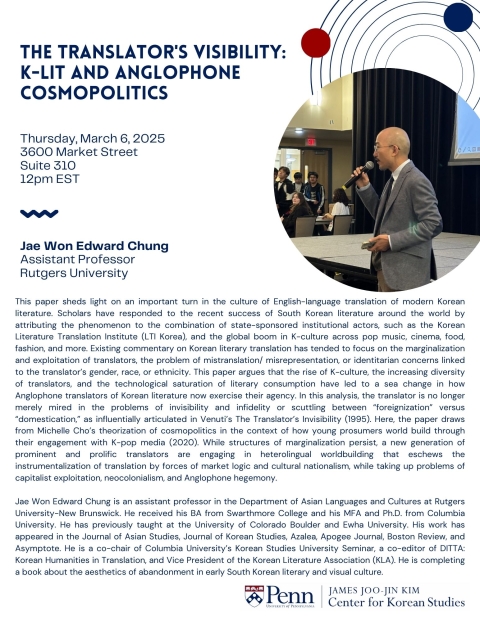
Korean Studies Colloquium
3600 Market Street, Suite 310
This paper sheds light on an important turn in the culture of English-language translation of modern Korean literature. Scholars have responded to the recent success of South Korean literature around the world by attributing the phenomenon to the combination of state-sponsored institutional actors, such as the Korean Literature Translation Institute (LTI Korea), and the global boom in K-culture across pop music, cinema, food, fashion, and more. Existing commentary on Korean literary translation has tended to focus on the marginalization and exploitation of translators, the problem of mistranslation/ misrepresentation, or identitarian concerns linked to the translator’s gender, race, or ethnicity. This paper argues that the rise of K-culture, the increasing diversity of translators, and the technological saturation of literary consumption have led to a sea change in how Anglophone translators of Korean literature now exercise their agency. In this analysis, the translator is no longer merely mired in the problems of invisibility and infidelity or scuttling between “foreignization” versus “domestication,” as influentially articulated in Venuti’s The Translator’s Invisibility (1995). Here, the paper draws from Michelle Cho’s theorization of cosmopolitics in the context of how young prosumers world build through their engagement with K-pop media (2020). While structures of marginalization persist, a new generation of prominent and prolific translators are engaging in heterolingual worldbuilding that eschews the instrumentalization of translation by forces of market logic and cultural nationalism, while taking up problems of capitalist exploitation, neocolonialism, and Anglophone hegemony.
Jae Won Edward Chung is an assistant professor in the Department of Asian Languages and Cultures at Rutgers University-New Brunswick. He received his BA from Swarthmore College and his MFA and Ph.D. from Columbia University. He has previously taught at the University of Colorado Boulder and Ewha University. His work has appeared in the Journal of Asian Studies, Journal of Korean Studies, Azalea, Apogee Journal, Boston Review, and Asymptote. He is a co-chair of Columbia University’s Korean Studies University Seminar, a co-editor of DITTA: Korean Humanities in Translation, and Vice President of the Korean Literature Association (KLA). He is completing a book about the aesthetics of abandonment in early South Korean literary and visual culture.
 James Joo-Jin Kim Center for Korean Studies
James Joo-Jin Kim Center for Korean Studies